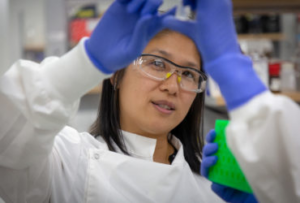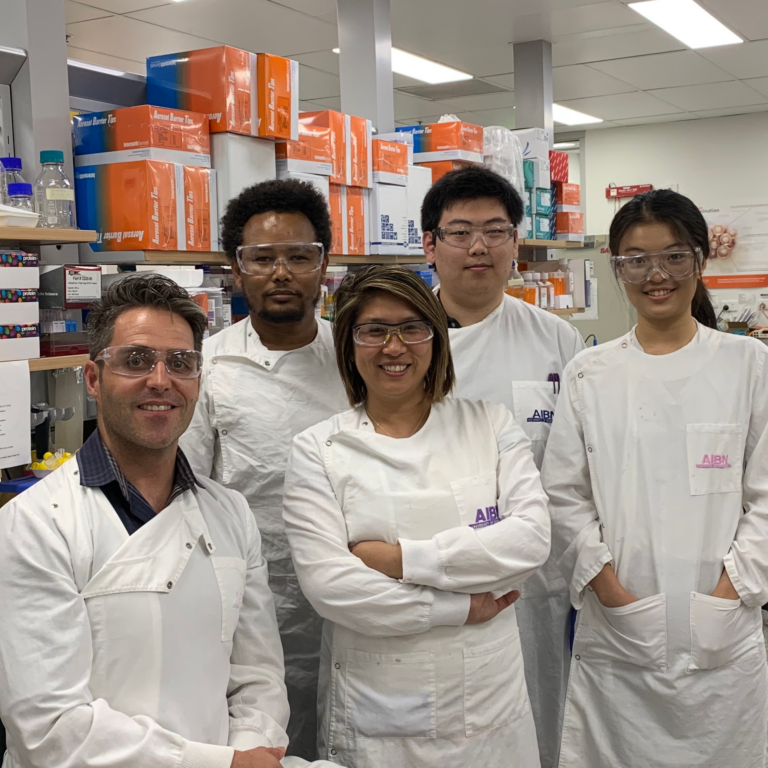Since we were founded in 2011, we have proudly contributed
$4 million to MND Research, thanks to our community of supporters.

$4 M
This amazing total is made possible by the outstanding fundraising efforts of all of our supporters, as well as donors both big and small. Public fundraising for MND research over the last few years has been an absolute game changer.
A significant portion of these funds have been raised thanks to NTI (National Transport Insurance) and their annual truck raffle in support of the Foundation. We are extremely grateful for their ongoing dedication, as well as our other corporate partners and the overall community.
Cohesive efforts from MND associations across the globe, catapulting off the success of campaigns such as the ice-bucket challenge has resulted in a surge in research and collaboration and new findings.
Current MND Research
2025 Grant Recipients
The MND and Me Foundation is committed to funding high quality research by ensuring the research grants are won through a competitive process. Projects are rigorously assessed and ranked by the Motor Neurone Disease Research Institute Australia (MNDRIA) Committee. This funding then can support researchers obtaining larger grants from the National Health and Medical Research Council.
We are proud to welcome Dr Sophia Luikinga in 2025 as the receipient of our signature Scott Sullivan Research Fellowship.

Dr Sophia Luikinga
Scott Sullivan Research Fellowship
Body fat composition and metabolism.
People living with motor neurone disease (plwMND) are known to have alterations in their body fat composition and metabolism. Fat molecules (also called lipids) are essential for the maintenance of motor neurons and muscles. Recently, I discovered that a subset of these lipids is unique to MND. However, this data is preliminary, and further tests will be necessary to assess if this is the case in a greater cohort of plwMND. We will assess the normal and abnormal ranges of the lipids that can then be communicated with specialists to be a biomarker for disease. Furthermore, we will assess the lipid biomarkers in a population of asymptomatic gene carriers to assess if these lipids are abnormal before symptom onset. Once this research is complete, I hope that this can help clinicians assess if drugs have a desired effect and how disease is progressing. This will in turn help with drug development and treatment strategies in the future.

A/Prof Dominic Ng
Fat Rabbit MND Research Grant
Protein links to ALS.
The numerous proteins linked to ALS share the interesting ability to behave like a liquid inside cells. When proteins behave like this, we call them protein condensates. Imagine these protein condensates as very much like the blobs in a lava-lamp. The blobs move around, break apart and can join up with other blobs seemingly at random and this behaviour is required to keep motor neurons healthy. Recently, we discovered that a subtle drop in pH, a measure of acidity or alkalinity, inside cells prevents the formation of protein condensates. This is significant as there is a gradual decrease in pH (acidosis) in our brains and spinal cords as we age and this coincides with the emergence of disease. Our study aims to determine whether this decreased pH changes the normal liquid behaviour of ALS proteins to trigger abnormal protein behaviour that can cause the loss of motor neurons. Our findings will help us better understand the early molecular triggers of disease and spur research in pH modulation as new treatments.

Dr Sonam Parakh
Col Bambrick MND Research Grant
There is an urgent need for new MND treatments.
There is an urgent need for new MND treatments. This proposal explores a novel strategy using drugs that target the electrical properties of motor neurons, the cells affected in MND. These properties are critical component of the brain’s communication system because they regulate nerve activity. We will examine whether these drugs are protective in human cells and mice that develop MND: the first step in their development for MND patients. Our approach is exciting because these drugs are ‘repurposed’, meaning they are already on the market for other conditions. This will expedite their development as a new treatment for MND.

Dr Lotta Oikari
NTI MND Research Grant
Abnormal aggregation of protein.
People with ALS have abnormal aggregation of a protein called TDP-43 in brain cells, contributing to disease progression. Recent research suggests that TDP-43 may also affect the function of the blood-brain barrier (BBB), which is a crucial defence system located in the blood vessels of the brain. How TDP-43 affects the BBB in ALS is not well understood. Here, we will use human stem cells, obtained from people with ALS to generate laboratory models of the BBB to investigate the role of TDP-43. We will investigate if abnormal TDP-43 in ALS leads to breakage of the BBB, leading to increased leakage of substances into the brain and whether this leads to increased inflammation in the brain. Understanding this relationship could help better understand ALS progression and develop new treatments for ALS.

Dr Eduardo Albornoz
Murray Geale MND Research Grant
“Brain in a dish model” for studying MND.
Our project aims to develop a new “brain in a dish model” for studying MND. Using blood cells from people living with MND, we generate microglial cells—the brain’s immune cells—and combine them with lab-grown brain-like structures (organoids) derived from stem cells. This advanced “mini-brain” system will allow us to test potential treatments in a way that closely mimics the conditions of the human brain. By focusing on immune pathways involved in inflammation and nerve damage, we aim to identify more effective and precise therapies for MND. Ultimately, this research could lead to a more personalised treatment approaches.

Dr Thais Sobanski
David Deguara Research Fellowship
Modulating glycolysis activity to confer neuroprotection in Amyotrophic Lateral Sclerosis (ALS).
This project will study how the breakdown of sugar for use as an energy substrate (i.e., glycolysis) can impact DNA repair in ALS. Defects in glycolysis and DNA repair pathways have been reported in ALS, but it is not known if the two pathways are linked. This project aims to understand how tweaking glycolysis activity could improve DNA repair and motor neuron survival. Outcomes will provide insight into the role of glycolysis in ALS and DNA repair, offering a new direction to identify novel interactions and targets to develop new treatment options to improve the prognosis for people living with ALS.
2024 Grant Recipients

Dr Rebecca San Gil
NTI MND Research Grant
Targeting protein aggregation in MND.
Disease onset in all cases of MND involves the accumulation of damaged proteins that stick together forming toxic aggregates that trigger motor neuron death. The proposed research program will take advantage of new genetic engineering and imaging techniques to shine the light on a target protein that refolds and disposes of damaged proteins in human neurons. Proof-of-concept experiments will demonstrate whether refolding damaged protein back into a functional protein can slow or stop disease progression. This work will identify new strategies in targeting protein aggregates to prevent neurodegeneration for future application to develop therapies for people living with MND.

Dr Hazel Quek
Fat Rabbit MND Research Grant
Microglia Diversity in ALS: Impact on Disease and Drugs.
Studying the complexity of immune cells, specifically microglia, in Motor Neuron Disease. Utilising a 3D cell culture model of MND microglia and employing single-cell RNA sequencing, our objective is to pinpoint distinct types of microglia and comprehend their unique roles in the disease. Additionally, we are examining how these cells respond to drugs, with the goal of enhancing our ability to treat MND more effectively.

Dr Thais Sobanski
David Deguara Research Fellowship
Modulating glycolysis activity to confer neuroprotection in Amyotrophic Lateral Sclerosis (ALS).
This project will study how the breakdown of sugar for use as an energy substrate (i.e., glycolysis) can impact DNA repair in ALS. Defects in glycolysis and DNA repair pathways have been reported in ALS, but it is not known if the two pathways are linked. This project aims to understand how tweaking glycolysis activity could improve DNA repair and motor neuron survival. Outcomes will provide insight into the role of glycolysis in ALS and DNA repair, offering a new direction to identify novel interactions and targets to develop new treatment options to improve the prognosis for people living with ALS.

Dr Andrew Tosolini
Col Bambrick MND Research Grant
Connecting the dots between the powerhouse of the motor neuron and their vulnerability in MND.
In MND, certain types of motor neurons are more susceptible to disease than others, but the cause of this selective vulnerability is not yet known. This project focuses on how the functions of mitochondria (the cells powerhouse) and metabolism (conversion of fuel into energy) are altered in motor neurons in MND. For the first time, we will use innovative technology to assess how clinically, or near-clinically, available drugs/compounds affect the mitochondria in motor neurons prone to disease. This project will result in crucial new knowledge about disease causes, which can improve the designing of new therapies for MND.

Dr Alain Wuethrich
Murray Geale MND Research Grant
Developing a new nanotechnology to track ALS.
To date, it has been difficult to develop therapies for ALS because there are few reliable biomarkers that can tell us about diagnosis, disease progression and outcome, whether someone will get ALS, and how someone with ALS responds to drug treatment. This project aims to develop a new nanotechnology for blood-based measurements of extracellular vesicles – the body’s natural nanoparticles – to see if they can provide key information to support diagnosis, and tracking of disease progression and outcome. We hope that this can also be used in future for testing drug responses in clinical trials.
2023 Grant Recipients

Dr Fleur Garton
Scott Sullivan Research Fellowship

Dr John Lee
NTI MND Research Grant
Dr Lee focusses on innate immune and inflammatory pathways including the complement system and inflammasomes in Motor Neurone Disease.
Current therapies are lacking and hence there is an urgent need for new research to identify new therapeutic targets and approaches to slow or halt disease progression. Dr. Lee’s research has demonstrated the therapeutic potential of multiple anti-inflammatory drugs targeting innate immune-mediated neuroinflammation to reduce neuronal cell death in animal models of neurodegenerative disease. He also has an emerging interest in the links between the immune system, stress response, and energy metabolism in neurodegeneration.

Dr Margreet Ridder
Fat Rabbit MND Research Grant

Dr Adam Walker
Col Bambrick MND Research Grant

Dr Frederik Steyn
Murray Geale MND Research Grant
Dr Ridder is working with her team to express their novel neuronal silencing receptor in motor neurons of MND mice. By trialing the drug activated receptors, the team are hoping to reduce neuron hyperexcitability and increase motor neuron survival.
If effective in increasing motor neuron survival, their receptor is already optimised for human clinical use and is activated by Ivermectin, a safe FDA-approved drug.
Dr Adam Walker is identifying enzymes that modify the pathological proteins (TPD-43) that accumulate in nerves of people with MND.
By testing human neurons grown in a dish, as well as brain samples, these experiments aim to identify new approaches to stop pathology forming. In the future, this work could guide the development of new drugs to treat MND.
Dr Frederik has created a more precise assessment of energy expenditure in MND patients and has set up a research platform to better analyse hypermetabolism’s role in the progression of MND.
He studies which factors impact patient outcomes and disease progression, such as metabolism and the burden of the disease, as well as the consequences of appetite loss and impaired body weight regulation. In conjunction with these studies, he collaborates with industry to develop new treatment approaches for MND and is working on refining digital health technologies for improved monitoring of disease progression and the effectiveness of therapy on disease outcomes.
A cure is out there, it just needs to be funded.
Clinical Trials and Research Opportunities
MND Research Institute Australia (MNDRIA) is the research arm of MND Australia. The MNDRIA was established in 1984 as a national organisation promoting medical and scientific research into MND. The organisation has been driven forward by the vision to understand the causes, find effective treatments and discover cures for MND.
Here you will find current clinical trials that are recruiting in Australia.


